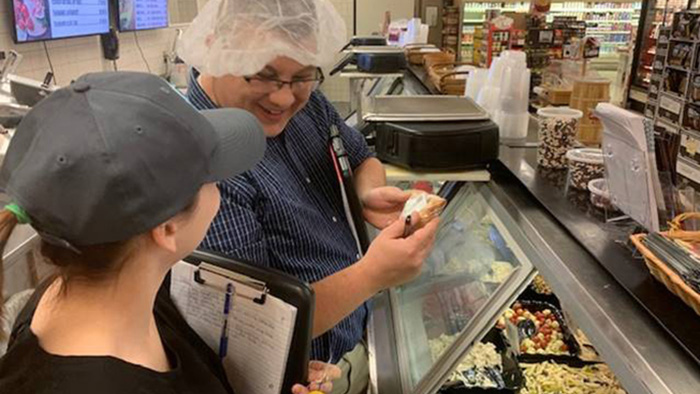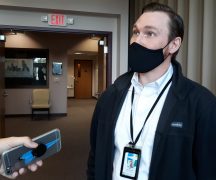By JAN McLAUGHLIN
BG Independent News
The number of critical violations at local restaurants last month was more than could be quietly stomached by some Wood County Board of Health members. During their monthly meeting Thursday evening, a couple of them voiced their distaste and concern for the health of customers at those establishments.
Board member Cathy Nelson pointed out the multiple food operations that had more than seven critical violations last month. “It’s pretty concerning,” she said.
And board member Richard Strow asked if progressive discipline could be handed out to those restaurants that repeatedly have high violation counts – sometimes with the same infractions.
Lana Glore, director of the environmental health division at the health department, explained that food operations found to have critical violations must fix them while the inspector is present, or the situation must be remedied in some way.
For example, Glore said, if a cooler is not maintaining food at cold enough temperatures, that cooler must be put out of service until it is fixed. Other accommodations must be found for the food, or if there is any risk to customers, the food must be disposed of.
Health department sanitarians make return visits to establishments that have critical violations.
For restaurants that continue to have ongoing problems, the sanitarians train designated employees to correct ongoing violations, such as workers not washing their hands before handling meat. Unfortunately, Glore said, with the high turnover rate in food service, that training is done frequently.
If there is an “immediate health risk” to the public, the health commissioner can take action.
“Nothing can remain a public health risk,” Glore said.
The health department can deny, suspend or revoke a food service license based on the history and seriousness of violations. However, the process takes a series of administrative hearings.
Inspection frequency is based on the risk level classification determined by the types of food preparation that take place, including reheating and hot holding.
Facility inspections are conducted one to four times per year, depending on the complexity of a facility’s menu and their potential risk of a foodborne illness. Inspection reports are available for viewing throughout the year as inspections are conducted at https://www.healthspace.com/Clients/Ohio/WoodCounty/WoodCounty_Web_Live.nsf/food-frameset.
The inspection risk levels range from 1 to 4. The lowest Level 1 involves pre-packaged foods. In those establishments, the sanitarian checks on labeling of food items, source of the food, storage temperatures and expiration dates.
The most extensive inspections occur for those establishments at Level 4, where foods go through several preparation steps, involving food originating from animals, where temperature control is needed to preclude bacterial growth, or where freezing is used as a means of parasite destruction.
The health department licenses and inspects restaurants, grocery stores, certain vending machines, and food stands at festivals and fairs. The food safety program is primarily responsible for protecting the community against foodborne illnesses resulting from health code violations and improper handling of food.
The January inspections that raised concerns among health board members included the following establishments with higher than average critical and non-critical violations:
- Rick’s Silver Moon Soda Grill, Perrysburg, 7 critical and 10 non-critical.
- Speedway Bar & Grill, Bradner, 7 critical and 10 non-critical.
- Lupita Mexican Taqueria, Bowling Green, 7 critical and 10 non-critical.
- Te’Kela, Perrysburg, 6 critical and 6 non-critical.
- El Zarape, Bowling Green, 5 critical and 9 non-critical.
- Holiday Inn Express, Perrysburg, 5 critical and 5 non-critical.
- Cocina de Carlos, Perrysburg, 5 critical and 3 non-critical.
An inspection report may not be representative of the overall, long-term conditions within an establishment. The inspection information provided in the public reports shows only the conditions of the facility at the time of the inspection.
The health department stresses that a single inspection report should not be used to evaluate the overall operation of an establishment. Looking at a facility’s inspection results over a period of time gives a more accurate picture of that facility’s commitment to compliance.
Two types of violations may be cited:
- Critical violations of food regulations are those which, if left uncorrected, are more likely than other violations to directly contribute to food contamination or illness. Examples include improper temperature control of food and the improper cooking, cooling, refrigeration, or reheating of food. Such problems can create environments that cause pathogens (bacteria/viruses) to grow and thrive, which put consumers at risk for food-borne illness.
- Non-critical violations are those not directly related to the cause of foodborne illness, however, if uncorrected, could affect the operation of the facility and lead to critical violations. Examples include a lack of facility cleanliness and maintenance or improper cleaning of nonfood-contact equipment.
Several types of inspections may be conducted by the health department sanitarians:
- Standard: This inspection is unannounced to the facility. A local health department sanitarian will conduct a complete inspection covering all items in the regulations for compliance.
- 30-day inspection: This is a standard inspection that must be conducted no more than 30 days after a license is issued to a new food service operation or retail food establishment.
- Pre-license inspection: This inspection is not required, but may be conducted by the local health department prior to issuing a license to a new food service operation or retail food establishment. The purpose of this inspection is to provide consultation and education to the operator.
- Critical control point (CCP): This inspection may be scheduled or unannounced. A sanitarian will spend time reviewing a facility’s food processes that may directly contribute to food contamination or illness, and will educate the facility on proper procedures.
- Process review (PR): This inspection may be scheduled or unannounced. This type of inspection is similar to a CCP inspection; however the inspections are conducted in facilities such as grocery stores or convenience stores. The inspection will focus on a specific process that may directly contribute to food contamination or illness.
- Follow-up inspection: This is an inspection for the specific purpose of re-inspecting items that were not in compliance at the time of the standard, CCP and/or PR inspection. These inspections are scheduled.
- Complaint: This is an unannounced inspection conducted as a result of a complaint received by a local health department. The specifics of the complaint will be evaluated and discussed with the person in charge of the facility.
If you see an unsafe practice in a licensed restaurant, store or food booth, call the Wood County Health Department at 419-354-2702. You do not need to give your name. An environmental health specialist will follow up with an inspection.





